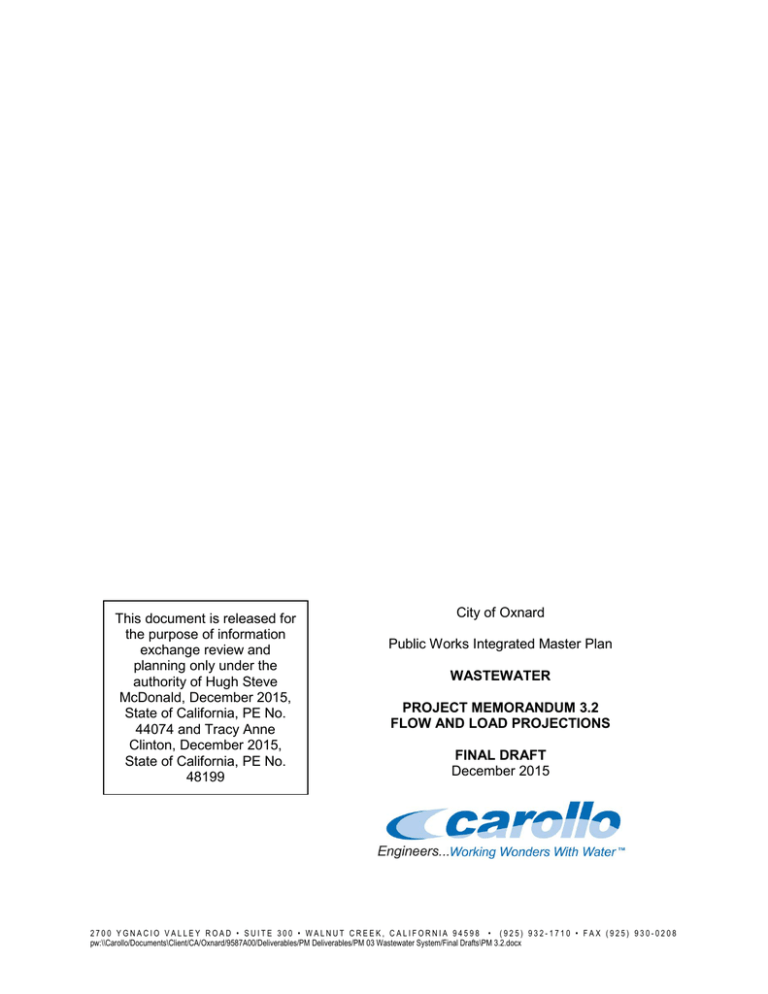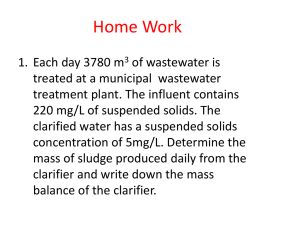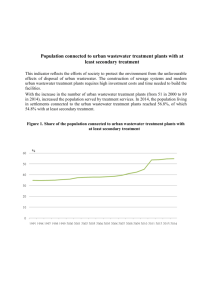Flow and Load Projections
advertisement

This document is released for the purpose of information exchange review and planning only under the authority of Hugh Steve McDonald, December 2015, State of California, PE No. 44074 and Tracy Anne Clinton, December 2015, State of California, PE No. 48199 City of Oxnard Public Works Integrated Master Plan WASTEWATER PROJECT MEMORANDUM 3.2 FLOW AND LOAD PROJECTIONS FINAL DRAFT December 2015 2700 YGNACIO VALLEY ROAD • SUITE 300 • WALNUT CREEK, CALIFORNIA 94598 • (925) 932-1710 • FAX (925) 930-0208 pw:\\Carollo/Documents\Client/CA/Oxnard/9587A00/Deliverables/PM Deliverables/PM 03 Wastewater System/Final Drafts\PM 3.2.docx City of Oxnard Public Works Integrated Master Plan WASTEWATER PROJECT MEMORANDUM 3.2 FLOW AND LOAD PROJECTIONS TABLE OF CONTENTS Page No. 1.0 INTRODUCTION ..................................................................................................... 1 1.1 Project Memorandums (PMs) Used for Reference ....................................... 1 1.2 Other Reports Used for Reference ............................................................... 1 2.0 PROJECTED POPULATION ................................................................................... 2 3.0 HISTORICAL WASTEWATER FLOWS AND LOADS .............................................. 2 3.1 Per Capita Flows and Loads (Residential & Commercial) ............................. 6 3.2 Industrial Flows and Loads ........................................................................... 8 3.3 Naval Base Ventura County (NBVC) Flows and Loads............................... 10 3.4 Desalter Concentrate Flows and Loads ...................................................... 10 4.0 PEAKING FACTORS ............................................................................................. 11 5.0 WASTEWATER FORECASTING METHODOLOGY .............................................. 12 5.1 Domestic/Commercial Projections .............................................................. 12 5.2 Industrial Projections .................................................................................. 12 5.3 Naval Base Ventura County Projections ..................................................... 14 5.4 Desalter Concentrate Projections ............................................................... 14 6.0 FUTURE WASTEWATER DEMAND PROJECTIONS ........................................... 15 6.1 Flow Projections ......................................................................................... 15 6.2 Load Projections......................................................................................... 16 LIST OF TABLES Table 1 Table 2 Table 3 Table 4 Table 5 Table 6 Table 7 Table 8 Table 9 Table 10 Table 11 Historical Wastewater Flows to OWTP (in mgd) ............................................. 2 Historical Wastewater Loads to OWTP ........................................................... 3 2010 Per Capita Flows and Loads .................................................................. 6 Estimated Domestic Per Capita Flows Based on Collection System Model .... 7 2013 Industrial Flows and Loads to Discharged OWTP .................................. 9 Historical OWTP Flow Peaking Factors ........................................................ 11 Historical OWTP Load Peaking Factors ........................................................ 11 Near-Term Industry Demand and Wastewater Flow Projections ................... 13 OWTP ADWF Projections ............................................................................. 15 OWTP Average Dry Weather BOD Load Projections .................................... 16 OWTP Average Dry Weather TSS Load Projections..................................... 17 FINAL DRAFT - December 2015 pw://Carollo/Documents/Client/CA/Oxnard/9587A00/Deliverables/PM Deliverables/PM 03 Wastewater System/Final Drafts/PM 3.2.docx i LIST OF FIGURES Figure 1 Figure 2 Figure 3 Figure 4 Figure 5 Figure 6 Figure 7 Figure 8 Historical Influent Flow.................................................................................... 4 Historical Influent BOD Load ........................................................................... 5 Historical Influent TSS Load ........................................................................... 5 Historical Influent NH3 Load ........................................................................... 6 Industrial Growth Projection .......................................................................... 14 Projected OWTP Influent Flow ...................................................................... 16 Projected OWTP Influent BOD Load ............................................................. 17 Projected OWTP Influent TSS Load ............................................................. 18 FINAL DRAFT - December 2015 pw://Carollo/Documents/Client/CA/Oxnard/9587A00/Deliverables/PM Deliverables/PM 03 Wastewater System/Final Drafts/PM 3.2.docx ii Project Memorandum 3.2 WASTEWATER FLOW AND LOAD PROJECTIONS 1.0 INTRODUCTION This Project Memorandum (PM) summarizes the City’s existing and projected future wastewater flows and pollution loads. Historical trends in flows and loads by discharger type were summarized and noted. These historical trends were then used to inform the forecasting methodology for future wastewater flow and load projections through the planning period for the Public Works Integrated Master Plan (PWIMP) of 2040. Since this analysis was conducted, the level sensor measuring influent flow was adjusted in the first quarter of 2015. This adjustment indicated that past flows may have been over reported. Given that, this analysis as well as the performance and capacity analysis performed in PM 3.4, Wastewater - Treatment Plant Performance and Capacity are conservative. 1.1 Project Memorandums (PMs) Used for Reference The wastewater flow and load projections outlined in this PM are made in concert with recommendations and analyses from other related PMs: • PM 1.3 – Overall - Population and Land Use Estimates. • PM 2.2 - Water System - Water Demand Projections. • PM 3.1 - Wastewater System - Background Summary. 1.2 Other Reports Used for Reference In developing the wastewater flow and load projections in this PWIMP, the following reports were used: • City of Oxnard 2030 General Plan, Development Services Department Planning Division, October 2011 (City of Oxnard General Plan, 2011). • Wastewater Engineering Treatment and Resource Recovery, Fifth Edition, (Metcalf and Eddy, 2014). • 2010 United States Census, (U.S. Census Bureau, 2010). • 2010 Census Traffic Analysis Zone (TAZ), U.S. Department of Commerce, U.S. Census Bureau, Geography Division, (TAZ, 2010). FINAL DRAFT - December 2015 pw://Carollo/Documents/Client/CA/Oxnard/9587A00/Deliverables/PM Deliverables/PM 03 Wastewater System/Final Drafts/PM 3.2.docx 1 • 2.0 Oxnard Industrial Discharge Permits, City of Oxnard, (Industrial Discharge Permits, 2014). PROJECTED POPULATION The Oxnard Wastewater Treatment Plant (OWTP) treats wastewater from the City of Oxnard, the City of Port Hueneme, and a number of significant industrial users. Both the City of Oxnard and the City of Port Hueneme flows were projected in conjunction with their population projections. All other entities contributing wastewater to the OWTP were projected separately and discussed in Section 3.2, 3.3, and 3.4 below. Population projections from the 2030 Oxnard General Plan were used for projecting the City of Oxnard population. As discussed in PM 1.3, Overall – Population and Land Use Estimates, the 2030 General Plan outlines four different population projections for the City. The low 2030 General Plan population projections were used for this analysis. Detailed discussion behind this decision can be found in PM 1.3, Overall - Population and Land Use Estimates. These population projections are consistent with population projections used for water demand forecasting outlined in PM 2.2, Water System – Water Demand Projections. In addition, the Oxnard Wastewater Treatment Plant (OWTP) treats wastewater from the City of Port Hueneme. US Census data in 2010 for the City of Port Hueneme indicated a population of 21,723 (U.S. Census Bureau, 2010). This is a 0.56 percent decrease in population from their 2000 US Census population. As a conservative estimate, it was assumed that Port Hueneme population would remain constant over the planning period. 3.0 HISTORICAL WASTEWATER FLOWS AND LOADS Historic influent wastewater flows and loads were analyzed for 2009 through 2013 and are shown in Tables 1 and 2 as well as Figures 1, 2, 3 and 4. These influent flows and loads include residential and commercial users, industrial dischargers, as well as desalter concentrate. Each of these three components are discussed separately in the sections that follow. Table 1 Historical Wastewater Flows to OWTP (in mgd) Public Works Integrated Master Plan City of Oxnard Historical Data Flow Condition 2009 2010 2011 2012 2013 2009-2013 Average Average Dry Weather Flow(1) 21.7 21.4 20.1 19.9 19.5 20.5 Average Annual(2) 22.4 22.2 21.6 20.5 19.7 21.3 Average Day Maximum Month(3) 24.2 24.1 24.3 21.4 FINAL DRAFT - December 2015 pw://Carollo/Documents/Client/CA/Oxnard/9587A00/Deliverables/PM Deliverables/PM 03 Wastewater System/Final Drafts/PM 3.2.docx 20.3 22.9 2 Table 1 Historical Wastewater Flows to OWTP (in mgd) Public Works Integrated Master Plan City of Oxnard Historical Data Flow Condition Maximum Week(4) (5) Maximum Day 2009 2010 2011 2012 2013 2009-2013 Average 24.6 26.9 26.0 21.9 20.7 24.0 26.9 30.5 31.6 25.5 23.5 27.6 Notes: (1) Average Dry Weather (ADW) Flow = Lowest 90 day running average flow. (2) Average Annual (AA) = Average for a 365 consecutive day period. (3) Average Day Maximum Month (ADMM) = Highest 28 day running average flow. (4) Maximum Week (MW) = Highest 7 day running average flow. (5) Maximum Day (MD) = Highest observed daily flow. Table 2 Historical Wastewater Loads to OWTP Public Works Integrated Master Plan City of Oxnard Historical Data Flow Condition BOD5(1) 2009 2010 2011 2012 2013 2009-2013 Average ADW, klb/d(2) 53.3 50.5 45.1 45.8 48.8 48.7 (3) ADW, mg/L 295 283 269 276 299 284 AA, klb/d 61.4 53.7 49.7 53.1 52.5 54.1 MM, klb/d MW, klb/d 67.9 85.3 59.1 64.7 56.3 59.4 59.7 62.7 61.4 66.9 61.3 67.8 MD, klb/d 108 88.2 94.2 76.6 92.5 91.9 ADW, klb/d 46.4 44.4 41.6 41.5 45.1 43.8 ADW, mg/L 257 249 248 250 277 256 AA, klb/d ADMM, klb/d 49.5 60.5 49.2 59.5 48.7 65.5 46.0 53.1 47.8 56.5 48.2 59.0 MW, klb/d 89.8 76.5 81.8 64.5 70.7 76.7 MD, klb/d 142 211 190 104 173 164 ADW, klb/d 6.53 6.26 5.97 6.22 6.30 6.26 ADW, mg/L 36.1 35.1 35.6 37.5 38.7 36.6 AA, klb/d ADMM, klb/d 6.85 7.88 6.51 7.51 6.63 7.64 6.80 7.99 6.47 6.83 6.65 7.57 MW, klb/d 9.63 8.33 8.24 10.2 7.77 8.83 TSS NH3-N FINAL DRAFT - December 2015 pw://Carollo/Documents/Client/CA/Oxnard/9587A00/Deliverables/PM Deliverables/PM 03 Wastewater System/Final Drafts/PM 3.2.docx 3 Table 2 Historical Wastewater Loads to OWTP Public Works Integrated Master Plan City of Oxnard Historical Data Flow Condition MD, klb/d 2009 9.63 2010 8.33 2011 8.24 2012 10.2 2013 7.77 2009-2013 Average 8.83 Notes: (1) These higher BOD values are likely due to high soluble BOD from the canning and food processing industry. (2) ADW = Influent load during ADW flow period. (3) ADW, mg/L calculated as ADW Load (lb/d) / ADWF (mgd) / 8.34. Influent Flow (mgd) 35.0 30.0 25.0 20.0 15.0 10.0 5.0 0.0 7/2/08 1/1/09 7/2/09 1/1/10 7/3/10 1/1/11 7/3/11 1/1/12 7/2/12 1/1/13 7/2/13 1/1/14 7/3/14 Figure 1 Historical Influent Flow FINAL DRAFT - December 2015 pw://Carollo/Documents/Client/CA/Oxnard/9587A00/Deliverables/PM Deliverables/PM 03 Wastewater System/Final Drafts/PM 3.2.docx 4 Influent BOD (kppd) 120 100 80 60 40 20 0 7/2/08 1/1/09 7/2/09 1/1/10 7/3/10 1/1/11 7/3/11 1/1/12 7/2/12 1/1/13 7/2/13 1/1/14 7/3/14 Figure 2 Historical Influent BOD Load Influent TSS (kppd) 120 100 Figure 3 80 60 40 20 0 7/2/08 1/1/09 7/2/09 1/1/10 7/3/10 1/1/11 7/3/11 1/1/12 7/2/12 1/1/13 7/2/13 1/1/14 7/3/14 Historical Influent TSS Load FINAL DRAFT - December 2015 pw://Carollo/Documents/Client/CA/Oxnard/9587A00/Deliverables/PM Deliverables/PM 03 Wastewater System/Final Drafts/PM 3.2.docx 5 Influent NH3 (kppd) 12.00 10.00 8.00 6.00 4.00 2.00 0.00 7/2/08 1/1/09 7/2/09 1/1/10 7/3/10 1/1/11 7/3/11 1/1/12 7/2/12 1/1/13 7/2/13 1/1/14 7/3/14 Figure 4 3.1 Historical Influent NH3 Load Per Capita Flows and Loads (Residential & Commercial) The majority of flows and BOD and TSS loads entering the OWTP come from residential and commercial dischargers. These commercial and residential discharges are not measured directly and instead must be calculated as the remainder of flow and loads once industrial and desalter concentrate flows and loads are subtracted off using a headworks flow and mass balance approach. It is typical for these residential and commercial flows and loads to be represented on a per capita basis. For the OWTP, per capita flows and per capita BOD and TSS loads were calculated using 2010 data, which was the most recent US Census data. The 2010 US Census population data for Oxnard and for Port Hueneme as well as recorded 2010 plant influent flows and BOD and TSS loads were used in this analysis. The results are summarized in Table 3. The resulting per capita flows and per capita BOD and TSS loads are within the range given for typical domestic and commercial per capita value (Metcalf and Eddy, 2014). Table 3 2010 Per Capita Flows and Loads Public Works Integrated Master Plan City of Oxnard Total OWTP Flow (mgd) 2010 BOD (ppd) TSS (ppd) 21.4 50,481 44,428 5.2 6070 5431 1.8 0 63 Influent(1) Industrial(2) Desalter Concentrate(2) FINAL DRAFT - December 2015 pw://Carollo/Documents/Client/CA/Oxnard/9587A00/Deliverables/PM Deliverables/PM 03 Wastewater System/Final Drafts/PM 3.2.docx 6 Table 3 2010 Per Capita Flows and Loads Public Works Integrated Master Plan City of Oxnard Flow (mgd) 2010 BOD (ppd) TSS (ppd) 14.4 44,911 38,935 64 gpd/capita 0.20 ppd/capita 0.17 ppd/capita Residential/Commercial(3) Per Capita(4) Typical Per Capita(5) 40-130 gpd/capita 0.11-0.26 ppd/capita 0.13-0.33 ppd/capita Notes: (1) 2010 recorded plant influent flow and loads. (2) 2010 flows and loads were assumed to be the same as 2014 flows and loads. This flow includes Naval base flow. (3) Residential and commercial flows and loads were back calculated by subtracting desalter concentrate and industry from total OWTP influent. (4) Per capita was calculated by dividing residential and commercial by the adjusted 2010 US Census population data for Oxnard and the 2010 US Census population data for Port Hueneme (Total Population: 223,222). Oxnard population data was adjusted to correct for a discrepancy in defined city boundary. (5) (Metcalf and Eddy, 2014). Per capita flows were also calculated through Oxnard’s collection system model. Dry weather flow monitoring was used to calibrate this model. In the calibration process residential per capita flows were estimated for each subcatchment basin. These estimated per capita flows were multiplied by the population for each subcatchment to determine overall residential flow. Commercial wastewater flows were estimated via water consumption data. As a conservative estimate, it was assumed that the wastewater generation coefficient for these commercial water demands was 1.0. An overall residential and commercial per capita flow was then calculated by taking the overall calibrated wastewater flow from both residential and commercial and dividing it by the overall Oxnard population. The results of this analysis of combined residential and commercial (domestic) per capitas are summarized in Table 4. As a conservative estimate, the larger per capita flow of 71.6 gpd/capita, as noted in Table 4, was used for domestic (residential and commercial) flow projections at the OWTP. Table 4 Estimated Domestic Per Capita Flows Based on Collection System Model Public Works Integrated Master Plan City of Oxnard Population(1) GPCD Flow (gpd) Residential - Meter Basin 1 25,526 65 1,659,190 Residential - Meter Basin 2 12,418 90 1,117,620 Residential - Meter Basin 3 28,188 90 2,536,920 Residential - Meter Basin 4 28,355 80 2,268,400 FINAL DRAFT - December 2015 pw://Carollo/Documents/Client/CA/Oxnard/9587A00/Deliverables/PM Deliverables/PM 03 Wastewater System/Final Drafts/PM 3.2.docx 7 Table 4 Estimated Domestic Per Capita Flows Based on Collection System Model Public Works Integrated Master Plan City of Oxnard Population(1) GPCD Flow (gpd) Residential - Meter Basin 5 782 90 70,380 Residential - Meter Basin 6 16,309 50 815,450 Residential - Meter Basin 7 11,415 70 799,050 Residential - Meter Basin 8 28,494 50 1,424,700 Residential - Meter Basin 9 17,711 75 1,328,325 Residential - Meter Basin 10 24,981 70 1,748,670 -- -- 2,205,399 194,179 -- 15,974,104 Commercial Total: Per Capita: 71.6 gpd/capita Note: (1) These populations are based on Traffic Analysis Zone (TAZ) 2010 numbers (TAZ, 2010). 3.2 Industrial Flows and Loads In Oxnard, there are 38 Significant Industrial Users (SIUs) (Industrial Discharge Permits, 2014). Many of these SIUs are food-processing facilities, with functions such as packaging and washing of fresh vegetables. There are also a large number of metals finishing and paper processing plants. In addition, there are two Ventura County Naval Bases: Point Mugu and Port Hueneme. Since these two Ventura County Naval Base SIUs primarily discharge domestic waste, for this analysis they have been broken out separately and are discussed in Section 3.3 below. The remaining 36 SIUs are discussed below. The largest industrial discharger is the Proctor and Gamble paper processing plant, which discharges on average 31 percent of flow, 21 percent of BOD load, and 46 percent of TSS load contributed by all 36 of the industrial dischargers. Combined, in 2013 all 36 SIUs discharged on average 4.5 mgd of wastewater, 6,070 ppd of BOD, and 5,400 ppd of TSS to the OWTP. Table 5 summarizes these flows and loadings. Table 5 also summarizes each SIU's permitted flow capacity. The majority of these SIUs are discharging at or above their permitted capacity. There are six SIUs that discharged less than their permitted capacity in 2013. If these six SIUs discharged at their permitted capacity, the additional flow discharged would be 0.08 mgd. FINAL DRAFT - December 2015 pw://Carollo/Documents/Client/CA/Oxnard/9587A00/Deliverables/PM Deliverables/PM 03 Wastewater System/Final Drafts/PM 3.2.docx 8 Table 5 2013 Industrial Flows and Loads to Discharged OWTP Public Works Integrated Master Plan City of Oxnard Industry Name ADF(1) Permit Limit (gpd) 2013 2013 2013 ADF Avg BOD Avg TSS (gpd) (ppd) (ppd) Metals Alliance Finishing & Manufacturing No flow at this time --(2) --(3) --(3) Aluminum Precision Products 7,475 7,000 N/A 1 Arcturus Manufacturing 24,141 25,000 N/A NA Coastal Metal Finishing/Limons Metal Finishing 4,000 1,000 N/A N/A Elite Metal Finishing 13,500 14,000 N/A N/A Raypak 10,850 11,000 N/A N/A 750 750 N/A N/A 309,000 300,000 70 65 1,376,291 1,400,000 1,300 2,500 Boskovich Farms 250,000 250,000 759 367 Cal Sun Produce 32,152 32,000 46 36 Coastal Green Vegetable Co. 220,000 220,000 402 550 Duda Farm Fresh Foods 37,000 37,000 156 48 Simba Cal Paper New Indy Proctor and Gamble Food Processing Frozsun Foods 350,000 350,000 1,083 347 Gill's Onions 250,000 250,000 386 111 Herzog Wine Cellars 10,250 10,000 182 16 J.M. Smucker Co. 148,000 148,000 172 276 --(3) Oxnard Lemon Co. 34,500 35,000 --(3) Pacific Ridge Farms 30,000 30,000 140 81 Saticoy Lemon #4 50,000 50,000 55 89 Scarborough Farms 17,000 17,000 4 61 6,000 25,000 --(3) --(3) 730,000 730,000 511 621 70,000 70,000 238 51 4,500 – 5,000 per disposal event --(4) --(4) --(4) 30,000 11,907 --(3) --(3) No flow at this time --(2) --(3) --(3) Deardorff Family Farms 10,000 10,000 3 4 EF Oxnard 15,000 15,000 N/A N/A Seaboard Produce Distributors Terminal Freezer (Del Mar, Suncoast, Tree Top) Ventura Pacific Co. Other Automotive Racing Products Consolidated Precision Products Crestview Municipal Water Co. FINAL DRAFT - December 2015 pw://Carollo/Documents/Client/CA/Oxnard/9587A00/Deliverables/PM Deliverables/PM 03 Wastewater System/Final Drafts/PM 3.2.docx 9 Table 5 2013 Industrial Flows and Loads to Discharged OWTP Public Works Integrated Master Plan City of Oxnard Industry Name Harris Water Conditioning ADF(1) Permit Limit (gpd) 138,000 2013 2013 2013 ADF Avg BOD Avg TSS (gpd) (ppd) (ppd) 138,000 2 22 Mission Linen Supply 39,000 39,000 71 44 Parker Hannifin 26,000 26,000 216 2 Puretec Industrial Water 100,000 100,000 12 36 Santa Clara Waste Water Co. 200,000 150,000 231 33 --(5) --(5) --(5) --(5) 18,650 19,000 25 72 4,500,000 6,070 5,400 Schlumberger Technology Seminis Total 4,600,000 Notes: (1) ADF = Average Day Flow. (2) No flow reported for 2013. (3) No BOD or TSS concentration reported for 2013. (4) Batch discharger. (5) Schlumberger has a dewatering (Groundwater) permit. 3.3 Naval Base Ventura County (NBVC) Flows and Loads There are two naval bases that contribute flows and loads to the OWTP. These naval bases are NBVC at Point Mugu and NBVC at Port Hueneme. In 2013, these two facilities discharged 0.36 mgd of flow. While loadings for these two facilities were not recorded, NBVC at Point Mugu and NBVC at Port Hueneme discharge mainly domestic wastewater. Thus, for the purposes of this analysis, it was assumed that their BOD and TSS concentrations were comparable to the observed overall BOD and TSS concentrations from domestic wastewater within the City of Oxnard. In 2013, NBVC at Point Mugu and NBVC at Port Hueneme discharged substantially less flow their permitted capacity. If these facilities discharged at their permitted capacity, combined they would discharge an additional 0.36 mgd. 3.4 Desalter Concentrate Flows and Loads In addition to industrial and residential/commercial dischargers, there are also two desalters that discharge their desalter concentrate to the OWTP. These desalters are the City of Oxnard Desalter and the Port Hueneme Water Agency Desalter. In 2013, these two desalter concentrate flows averaged 1.85 mgd. While these two dischargers are classified as SIUs, they have been separated out in this report because, unlike industry, desalter concentrate generally does not contribute substantially to BOD and TSS loadings. Because of these low loadings, these two desalter concentrate dischargers will not have a large impact on the capacity rating of the plant. FINAL DRAFT - December 2015 pw://Carollo/Documents/Client/CA/Oxnard/9587A00/Deliverables/PM Deliverables/PM 03 Wastewater System/Final Drafts/PM 3.2.docx 10 4.0 PEAKING FACTORS Historical peaking factors were also determined for combined influent flows and loadings. Table 6 outlines historical peaking factors for 2009 to 2013 flows. Table 7 outlines historical peaking factors for 2009 to 2013 BOD and TSS loads. The 2009-2013 average peaking factors were used for projecting flows and loads. Table 6 Historical OWTP Flow Peaking Factors Public Works Integrated Master Plan City of Oxnard Historical Peaking Factors Flow Condition Average Dry Weather Flow Average Annual Maximum Month Maximum Week Maximum Day Table 7 2009 1.0 1.03 1.12 1.14 1.24 2010 1.0 1.04 1.13 1.26 1.43 2011 1.0 1.08 1.21 1.29 1.58 2012 1.0 1.03 1.07 1.10 1.28 2013 1.0 1.01 1.04 1.06 1.20 2009-2013 Average 1.0 1.04 1.11 1.17 1.35 Historical OWTP Load Peaking Factors Public Works Integrated Master Plan City of Oxnard Historical Peaking Factors Load Condition BOD5 Average Dry Weather Load Average Annual Maximum Month Maximum Week Maximum Day TSS Average Dry Weather Load Average Annual Maximum Month Maximum Week Maximum Day NH3-N Average Dry Weather Load Average Annual Maximum Month FINAL DRAFT - December 2015 2009 2010 2011 2012 2013 20092013 Average 1.0 1.15 1.31 1.60 2.03 1.0 1.06 1.17 1.28 1.75 1.0 1.10 1.25 1.32 2.09 1.0 1.16 1.31 1.37 1.67 1.0 1.08 1.26 1.37 1.90 1.0 1.11 1.26 1.39 1.89 1.0 1.07 1.30 1.94 3.05 1.0 1.11 1.34 1.72 4.75 1.0 1.17 1.58 1.97 4.58 1.0 1.11 1.28 1.55 2.50 1.0 1.06 1.25 1.57 3.84 1.0 1.10 1.35 1.75 3.74 1.0 1.05 1.21 1.0 1.04 1.20 1.0 1.11 1.28 1.0 1.09 1.28 1.0 1.03 1.08 1.0 1.06 1.21 pw://Carollo/Documents/Client/CA/Oxnard/9587A00/Deliverables/PM Deliverables/PM 03 Wastewater System/Final Drafts/PM 3.2.docx 11 Table 7 Historical OWTP Load Peaking Factors Public Works Integrated Master Plan City of Oxnard Historical Peaking Factors Load Condition BOD5 Average Dry Weather Load Average Annual Maximum Month Maximum Week Maximum Day TSS Average Dry Weather Load Average Annual Maximum Month Maximum Week Maximum Day 2009 2010 2011 2012 2013 20092013 Average 1.0 1.15 1.31 1.60 2.03 1.0 1.06 1.17 1.28 1.75 1.0 1.10 1.25 1.32 2.09 1.0 1.16 1.31 1.37 1.67 1.0 1.08 1.26 1.37 1.90 1.0 1.11 1.26 1.39 1.89 1.0 1.07 1.30 1.94 3.05 1.0 1.11 1.34 1.72 4.75 1.0 1.17 1.58 1.97 4.58 1.0 1.11 1.28 1.55 2.50 1.0 1.06 1.25 1.57 3.84 1.0 1.10 1.35 1.75 3.74 Maximum Week Maximum Day 1.48 1.48 1.33 1.33 1.38 1.38 1.64 1.64 1.23 1.23 1.41 1.41 5.0 WASTEWATER FORECASTING METHODOLOGY This section outlines the methodology used to project future wastewater flows and loadings to the OWTP. Based on a review of the available data, it was determined that the most accurate wastewater forecasting approach for this PWIMP is a combination of a populationbased per capita method for domestic (residential and commercial), and a land use based projection method for industry. 5.1 Domestic/Commercial Projections Residential and commercial wastewater flow and load projections were estimated using the population projections outlined in PM 1.3 plus the 2010 US Census Port Hueneme population. A per capita daily flow of 71.6 gpd/capita, a per capita daily BOD load of 0.20 ppd/capita, and a per capita daily TSS load of 0.17 ppd/capita were used to project flows and loadings to the OWTP in conjunction with population projections. 5.2 Industrial Projections Industry was projected in two components: existing industry and new industry. For existing industry, it was assumed that the 30 SIUs currently discharging at or above their permitted flow would continue to discharge at existing 2013 flows and loadings through the planning horizon. There are six remaining industries that discharge less flow than what their FINAL DRAFT - December 2015 pw://Carollo/Documents/Client/CA/Oxnard/9587A00/Deliverables/PM Deliverables/PM 03 Wastewater System/Final Drafts/PM 3.2.docx 12 discharge permit allows. As a conservative estimate, it was assumed that these industries would discharge flow at their permit limit. This additional flow was assumed to have a BOD and TSS concentration consistent with average industry BOD and TSS concentrations. This was assumed since some industries have no historical loading data. New industry wastewater flow projections were estimated using water demand projections outlined in PM 2.2. In PM 2.2, new industrial developments were discussed for Sakioka Farms, El Camino, and South Shore. Industrial infill was also mentioned. These additional industrial demands were calculated via future land use and allocated for 2020 and for 2040. Table 8 outlines these demands. As a conservative estimate, it was assumed that the wastewater generation coefficient for this additional industrial water demand is 1.0. Additionally, it was assumed that new industry would grow linearly from 0 to the 2020 water demand projections and then linearly again to the 2040 water demand projections. Figure 5 summarizes this industrial growth projection. BOD and TSS concentrations for this new industrial wastewater component were assumed to be 850 ppd and 400 ppd, respectively. These values were chosen based on a review of the range of historical industrial wastewater strengths, and on best professional judgment. Table 8 Map ID Near-Term Industry Demand and Wastewater Flow Projections Public Works Integrated Master Plan City of Oxnard Development Name Dev. Size acres Demand Factor (gpd/ac) ADD by 2020 (mgd) ADD by 2040 (mgd) 6 Sakioka Farms Industry 280.5 3500 0 0.98 7 El Camino Industry 79.2 3500 0 0.28 13 South Shore Industry 31.63 3500 0 0.11 16 Industrial Infill 106 3500 0.36 0.37 0.36 1.74 Total FINAL DRAFT - December 2015 pw://Carollo/Documents/Client/CA/Oxnard/9587A00/Deliverables/PM Deliverables/PM 03 Wastewater System/Final Drafts/PM 3.2.docx 13 7 6 Incremental Industrial Growth Flow (mgd) 5 4 3 2 1 0 2010 2015 2020 2025 2030 2035 2040 2045 Year Projected Industrial and NBVC Flow to the OWTP Figure 5 5.3 Industrial Growth Projection Naval Base Ventura County Projections Similarly to industrial flow and load projections, it was assumed that both NBVC at Point Mugu and NBVC at Port Hueneme would discharge at their permitted limit throughout the planning period. It was also assumed that the additional flow projected for these NBVCs would have a BOD and TSS concentration consistent with the average residential/ commercial concentrations. This assumption seems reasonable since these two wastewater dischargers are mainly domestic wastewater. 5.4 Desalter Concentrate Projections Projected desalter concentrate flows and loads from the Oxnard Desalter and Port Hueneme Water Agency Desalter were not included in the flow projections to the OWTP headworks. This is because the desalter concentrate composition of total dissolved solids are not anticipated to impose a demand on the primary and secondary wastewater treatment unit operations at OWTP. Additionally, in the future, it is planned that the desalter concentrate will be discharged to the outfall through a separate concentrate line, bypassing the OWTP. FINAL DRAFT - December 2015 pw://Carollo/Documents/Client/CA/Oxnard/9587A00/Deliverables/PM Deliverables/PM 03 Wastewater System/Final Drafts/PM 3.2.docx 14 6.0 FUTURE WASTEWATER DEMAND PROJECTIONS This section summarizes the flow and load projections anticipated through 2040. The purpose of the master planning projections presented in this section is to allow for a conservative estimate of future wastewater flows and loadings. The projections presented herein are the basis for triggering the preliminary design of future treatment facilities in time to allow for the typical five to seven years that it takes to implement new wastewater capacity. Once the preliminary and final designs of those facilities are triggered, however, the need and timing will be further reviewed and confirmed. Nevertheless, over the 20-year planning horizon, it is anticipated that these projected flows and associated facilities will be realized. 6.1 Flow Projections The projected ADW flow is summarized in Table 9, categorized by use type; Figure 6 illustrates both ADW flow and ADMM flow projections (in aggregate). While historical flow records indicate a decrease in influent flows to the plant, this observed decline in recent years is likely due to the current drought. The drought has likely caused a reduction in water usage and observed groundwater infiltration in the collection system. Both of these effects result in decreased flows to the OWTP. Therefore, based on our best professional judgment, there should be an allowance for a “rebound” effect following a return to more normal rainfall patterns in the future, as shown in the PWIMP flow projections. Table 9 Year OWTP ADWF Projections Public Works Integrated Master Plan City of Oxnard Existing Existing Industry and NBVCs Industry Additional Residential/ and New Desalter Permitted Industry Concentrate Total Commercial NBVCs Population (mgd) (mgd) Flow (mgd) (mgd) (mgd) (mgd) 2015 232,596 16.6 5.20 0.44 0 0 22.3 2020 241,971 17.3 5.20 0.44 0.37 0 23.3 2025 251,345 18.0 5.20 0.44 0.71 0 24.3 2030 260,719 18.7 5.20 0.44 1.06 0 25.3 2035 270,093 19.3 5.20 0.44 1.40 0 26.4 2040 279,468 20.0 5.20 0.44 1.74 0 27.4 FINAL DRAFT - December 2015 pw://Carollo/Documents/Client/CA/Oxnard/9587A00/Deliverables/PM Deliverables/PM 03 Wastewater System/Final Drafts/PM 3.2.docx 15 32 30 28 Flow (mgd) 26 24 22 20 18 16 14 12 2005 2010 2015 2020 2025 Historical Average Dry Weather Flow Historical Maximum Month Flow Figure 6 6.2 Year 2030 2035 2040 2045 Projected Average Dry Weather Flow Projected Maximum Month Flow Projected OWTP Influent Flow Load Projections Wastewater ADWL and MM BOD and TSS loading projections are summarized in Tables 10 and 11 and illustrated in Figures 7 and 8. These loading projections are divided by discharge type in the table and shown in aggregate in the figure. Table 10 OWTP Average Dry Weather BOD Load Projections Public Works Integrated Master Plan City of Oxnard Existing Existing Industry and NBVCs Industry Additional Residential/ and New Desalter Commercial NBVCs Permitted Flow Industry Concentrate Total (ppd) (ppd) (ppd) (ppd) (ppd) (ppd) Year Population 2015 232,596 46,276 6,070 429 0 0 52,774 2020 2025 241,971 251,345 48,141 50,006 6,070 6,070 429 429 2,623 5,051 0 0 57,262 61,555 2030 260,719 51,871 6,070 429 7,479 0 65,848 2035 270,093 53,736 6,070 429 9,907 0 70,145 2040 279,468 55,601 6,070 429 12,335 0 74,443 FINAL DRAFT - December 2015 pw://Carollo/Documents/Client/CA/Oxnard/9587A00/Deliverables/PM Deliverables/PM 03 Wastewater System/Final Drafts/PM 3.2.docx 16 Table 11 OWTP Average Dry Weather TSS Load Projections Public Works Integrated Master Plan City of Oxnard Existing Existing Industry and NBVCs Industry Additional Residential/ and New Desalter Commercial NBVCs Permitted Flow Industry Concentrate Total Year Population (ppd) (ppd) (ppd) (ppd) (ppd) (ppd) 2015 232,596 40,570 5,431 378 0 0 46,378 241,971 42,205 5,431 378 2,623 0 50,636 2025 251,345 43,840 5,431 378 5,051 0 54,699 2030 260,719 45,475 5,431 378 7,479 0 58,762 2035 270,093 47,110 5,431 378 9,907 0 62,826 2040 279,468 48,745 5,431 378 12,335 0 66,889 BOD Load (ppd) 2020 100,000.0 90,000.0 80,000.0 70,000.0 60,000.0 50,000.0 40,000.0 30,000.0 20,000.0 10,000.0 0.0 2005 2010 2015 2020 2025 2030 2035 2040 2045 Year Figure 7 Historical Average Dry Weather BOD Load Projected Average Dry Weather BOD Load Historical Maximum Month BOD Load Projected Maximum Month BOD Load Projected OWTP Influent BOD Load FINAL DRAFT - December 2015 pw://Carollo/Documents/Client/CA/Oxnard/9587A00/Deliverables/PM Deliverables/PM 03 Wastewater System/Final Drafts/PM 3.2.docx 17 100,000.0 90,000.0 TSS Load (ppd) 80,000.0 70,000.0 60,000.0 50,000.0 40,000.0 30,000.0 20,000.0 10,000.0 0.0 2005 2010 2015 2020 2025 2030 2035 2040 2045 Year Figure 8 Historical Average Dry Weather TSS Load Projected Average Dry Weather TSS Load Historical Maximum Month TSS Load Projected Maximum Month TSS Load Projected OWTP Influent TSS Load FINAL DRAFT - December 2015 pw://Carollo/Documents/Client/CA/Oxnard/9587A00/Deliverables/PM Deliverables/PM 03 Wastewater System/Final Drafts/PM 3.2.docx 18





